
The system built to manage Russia’s nuclear legacy is crumbling, our new report shows
Our op-ed originally appeared in The Moscow Times. For more than three decades, Russia has been burdened with the remains of the Soviet ...
News

Publish date: February 24, 2014
News
On the closing day of the Sochi Olympics, police arrested activist Olga Noskovets of the Environmental Watch on the North Caucasus (EWNC) and civil activist David Khakim, today are in custody and awaiting a hearing on charges of disobeying police orders – an offense that carries with it a 15 day jail sentence, their lawyer said.
Meanwhile, Yevgeny Vitishko, the EWNC activist sentenced to three years in a penal colony, but who was instead last week secretly sent to Krasnodar’s remand jail, is no longer being held there, and his whereabouts are again unknown. His absence is all the more alarming as he was said by his Krasnodar-based lawyer, Marina Dubrovina, to be suffering from a severe cough and that he had been refused medical treatment.
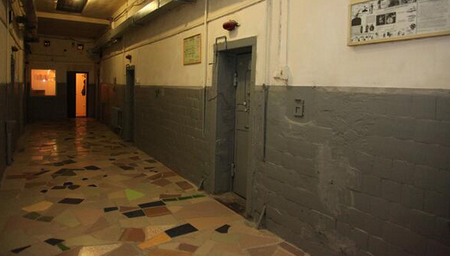
Both Khakim and Noskovets were in court at 10:00 am local time, but the hearings for each of the detainees were by early afternoon put off until tomorrow, according to EWNC.
Activists hear the other shoe drop
The harsh dawn in Russia this morning seemed to answer lingering questions posed by the Western media as to whether the dimming of the spotlight on Sochi would lead to crackdowns on dissent. From the point of view of environmental activists with EWNC, who endured unending harassment before and during the Olympic Games, the more relevant question is if the repressions will ever stop. Khakim and Noskovet’s hearing in Sochi coincided with the sentencing of seven people who were involved in fisticuffs with police during an anti-Putin rally in 2012.
The Bolotnaya 7, so dubbed for Moscow’s Bolotnaya Square where the clashes between demonstrators and Police took place, each received jail sentences ranging from 2 1/2 to 5 years, according to reports from The Moscow Times. Police arrested more than 400 demonstrators who protested the verdict.
The Bolotnaya detainees have long been considered Prisoners of Conscience by Amnesty International. Vitishko has also been conferred Prisoner of Conscience status. Khakim and Noskovets were allowed to confer with their lawyer, Alexander Popkov, who maintained live tweets during the early portions of today’s initial hearing.
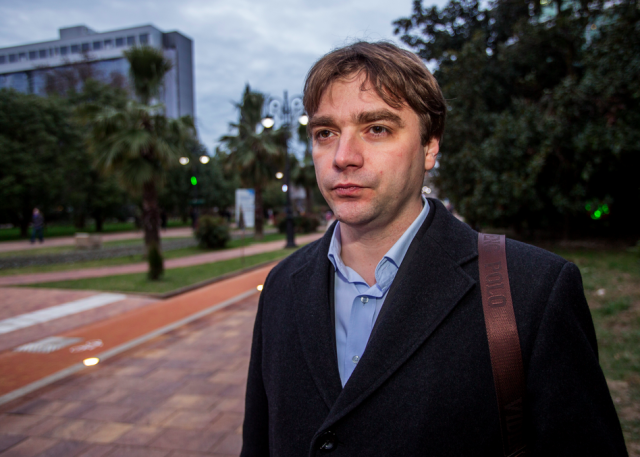
Both Noskovets and Khakim were told last night when they were arrested that they would be spending at least 48 hours at the Khosta district police station, said Popkov, who conferred with them last night. Last night, Khakim was held in solitary confinement and said, via Popkov’s twitter account, that he was on a hunger strike. Noskovet’s meanwhile appeared in court complaining that she had not been fed either.
She was said by Popkov to have suffered a serious asthma attack in her jail cell last night.
Swearing, inebriated cops
After their arrest yesterday, an officer at the Khosta district police station, who identified himself to Bellona as lieutenant colonel Andrei Bondarev, first angrily refused comment to the media and slammed down the phone. When he was called back, he confirmed, using foul language, that he had the two activists in custody and that he expected them to “get the full works” at today’s hearing. Popkov confirmed that, when he had visited the police station last night, the officers used foul language and seemed drunk.
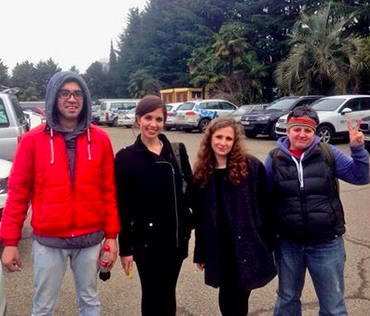
Popkov said he believed his clients Noskovets and Khakim had been detained for their associations with Pussy Riot’s visit to Sochi. “I think this is the police’s revenge against the activists for their civil activism and their ties to Pussy Riot,” he said.
Tolokonnikova and her band mate Masha Alyokhina travelled to Sochi last week to perform their new song, “Putin Will Teach you How to Love the Motherland” which they dedicated to Vitishko and the Bolotnaya prisoners.
Both women were horsewhipped and pepper-sprayed by Cossack militiamen in front of an international television audience as they tried to perform the song in public. The previous day, February 18, the two were taken into custody in Sochi’s Adler district for allegedly stealing a purse.
www.youtube.com/watch?v=eiw0fw_sJOk
Vitishko again missing
Vitishko’s new disappearance became known when the EWNC’s Anna Mikhailova tried to deliver a parcel to Vitishko, who is ailing from what his Krasnodar lawyer Marina Dubrovina on Friday said was a serious cough. Mikhailova was told Vitishko was no longer being held at the jail.
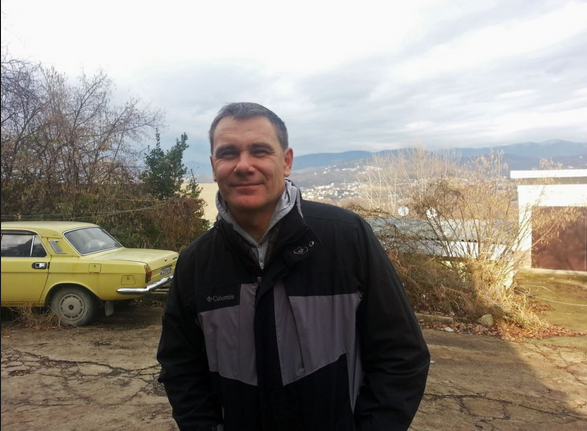
Anna Mitrenko of the Public Monitoring Committee, a prisoners’ rights group affiliated with the Presidential Council for Human Rights, who helped Dubrovina locate her client, also said today that she was unable to establish his whereabouts.
She has filed an inquiry with corrections authorities, but doesn’t expect to hear anything soon. Dubrovina assumes Vitishko has been transferred to the prison colony, though neither she, nor Vitishko’s wife nor other members of EWNC know which prison colony he is headed for, each confirmed in telephone and email interviews with Bellona.
Suren Gazaryan, a member of EWNC who fled Russia last year for Estonia over a trumped up charge, said Vitishko had been transported outside the Krasnodar Region, meaning he could be headed for a penal colony a considerable distance from home.
Vitishko’s treatment during the Olympics
During the course of the Sochi Games, Vitishko has his appeal against a three-year penal colony sentence for spray-painting a fence located on protected lands in 2011 overturned by Krasnodar court judge Andrei Konov. Vitishko was also jailed between February 3 and 18 on trumped up charges of public swearing and held in his hometown jail of Tuapse, 70 kilometers northwest of Sochi, to keep him away from Western media as well as from attending his appellate hearing in Krasnodar.
Though he was supposed to be freed on the February 18 to say goodbye to his family before turning himself over to penal colony officials, he was instead secretly sent to the Krasnodar jail via an illegal order signed by judge Konov who overturned his Kranodar appeal. The day that Pussy riot was hauled in over the alleged purse theft coincided with almost to the minute with when Vitishko was to be freed prior to transport to the penal colony.
What is Russia trying to shut up?
Tolokonnikova told Bellona from custody by telephone that her and Alyokhina’s arrest served as a media distraction from Vitishko’s initial disappearance. All of this juggling of Vitishko is believed by his supports and Bellona to have been a method to prevent him from speaking out on the environmental devastation visited on the Krasnodar Region, where Sochi is located, by the Olympic build out – findings that EWNC released in Moscow on February 12, the same day Vitishko had his appeal turned down.
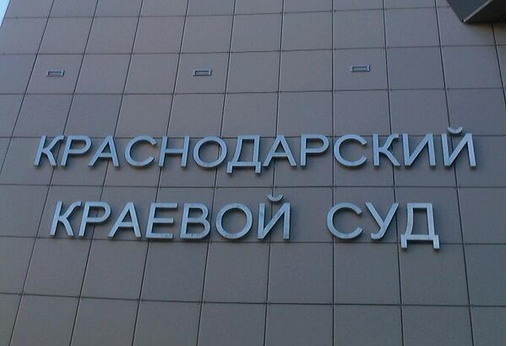
The EWNC report is currently available only in Russian, but an English version is expected soon. In particular, the report focuses on the shredding of Russian environmental law and reversing of legislation protecting national parks and nature reserves in order to allow for Olympic facilities be built.
As a result, construction of seafront Olympic venues razed more than 8,000 acres of Sochi National Park, a UNESCO World Heritage Site. The Imeritisnk Wetlands, home to dozens of species of endangered birds as well as mirgratory home for hundreds of other species, were buried under more than two meters of crushed construction rock.
Reptiles and brown bears have reportedly gone missing from surrounding mountain areas. Water pollution in the Mzymta River, once a major spawning site, threatens a fifth of Russia’s Black Sea salmon, and has drastically impacted Sochi’s drinking water supply.
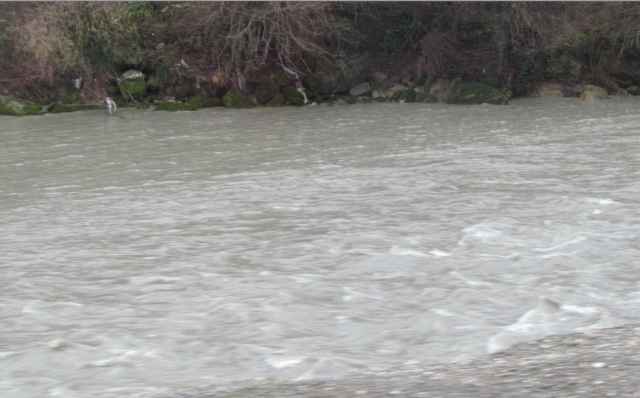
Allegations of water problems go as far back to 2009 when, according to Human Rights Watch, a road installed as part of the infrastructure for the Olympics paved over four of the five wells supplying drinking water to Akhshtyr, a mountain village between the seafront venues of Sochi and the Olympic alpine ski areas. Water runoff from the road made using water from the last well dangerous.
Environmental insults further poured into Akhshtyr when Russian Railways, Russia’s state railroad monopoly, began illegally dumping tons of construction waste into a landfill there. The EWNC raised concerned that seepage from the dump would contaminate ground water and thus further imperil Sochi’s drinking water. Some 1,500 other landfills, dumps and illegal quarries gash the mountainsides between Sochi and the mountain ski resorts.
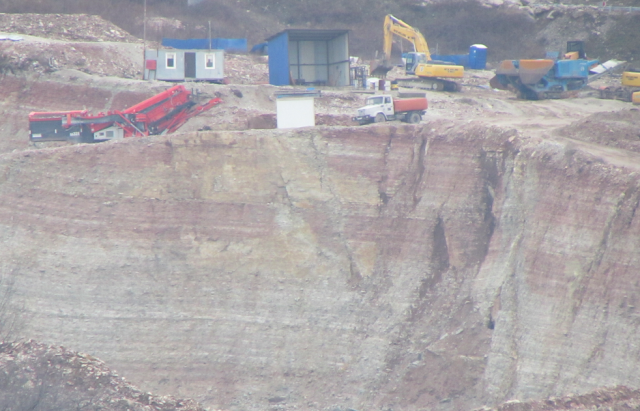
With the damage now done and still not fully calculated, even Deputy Prime Minister Dmitry Kozak – who, as Putin’s Olympic point man, sanctioned the construction of so many venues and hotels on Sochi’s wetlands – declared last week that keeping the illegally built infrastructure from tumbling into the sea or crushing under its own weight will require another $7 billion over the next three years, Kavkazky Uzel reported (in Russian).
This on top of the $51 billion already sunk into the decimation of the Black Sea coast doesn’t bode well for Putin’s dream of a world class modern Russian sports and resort venue.
International Olympic Committee chairman Thomas Bach, meanwhile hailed the Sochi games, saying, as quoted by the Associate Press, “’I would like to thank the President of the Russian Federation, Mr Vladimir Putin, for his personal commitment to the extraordinary success of these Olympic Winter Games.” The cybersphere is already astir with condemnation for Bach and demands that the IOC revise its standards on the environmental and human rights policies of countries to which it awards the Games.

Our op-ed originally appeared in The Moscow Times. For more than three decades, Russia has been burdened with the remains of the Soviet ...

The United Nation’s COP30 global climate negotiations in Belém, Brazil ended this weekend with a watered-down resolution that failed to halt deforest...

For more than a week now — beginning September 23 — the Zaporizhzhia Nuclear Power Plant (ZNPP) has remained disconnected from Ukraine’s national pow...

Bellona has taken part in preparing the The World Nuclear Industry Status Report 2025 and will participate in the report’s global launch in Rome on September 22nd.